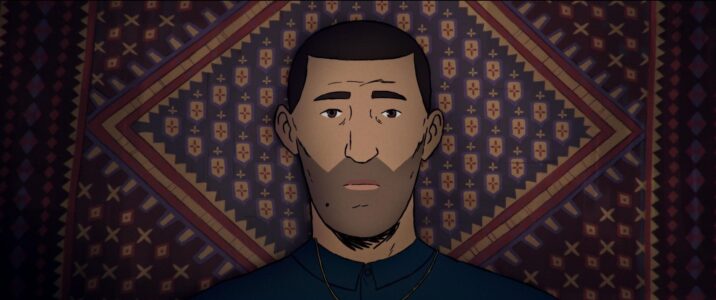As part of an ongoing series, Alex highlights some of the major titles featured in the first virtual edition of this year’s Sundance Film Festival.
Amin Nasar, the protagonist of Flee, is first seen laying on a couch with his eyes closed. We can tell he is a young man, but his expression suggests one whose experiences have aged him well beyond his years. As he attempts to recall his childhood, the tension from his brow indicates a man grappling with vicious demons tormenting him his entire life.
Amin, an Afghani refugee who resides in Denmark, is indeed struggling with personal trauma. His journey in making peace with the past drives the focus of Jonas Poher Rasmussen’s animated documentary/biopic Flee. Rasmussen’s decision to tell Nasar’s life story through animation elicits comparisons to Ari Folman’s Waltz with Bashir. There is even the insertion of historically contextualizing live action archive footage, dispersed more liberally by Jonas throughout his film than Folman does only in his shattering climax. The choice to regale Amin’s story, as well as the struggles in his private life, through animation are smart decisions by the director. To dramatize it with live actors would feel exploitative while relying merely on talking heads would fail to convey Amin’s emotional arc. Animation is truly the best medium for capturing an impressionistic view as the character designs alternate between colored detail and sketchy outlines. This aesthetic decision more easily enables a striking transition into emotionally harrowing moments of psychological dissociation.
We see Amin’s idyllic childhood days in Afghanistan punctured by the rise of Mujahideen insurgents at the end of the Soviet-Afghan war, forcing his family to seek exile in post-Soviet Russia. Corrupt cops forcefully extract bribes in exchange for turning a blind eye to the family’s expired visas. This incessant harassment leaves the family desperately seeking passage to Sweden where Amin’s eldest brother, Abbas, lives. But the emigration through human trafficking proves hellish, leading to decisions that will torment the young Amin’s mind into adulthood.
But Amin’s past struggles are not the sole focus of Flee. The film also cuts to the present day where we see how his personal issues complicate his relationship with his supportive yet weary partner Kasper. Amin loves him yet harbors some reluctance in finding a new home with Kasper. Perhaps it has to do with living such a precarious existence for so long. When asked what the term “home” means to him, Amin describes it as “somewhere safe. Somewhere you can stay and not move on.” By the time he has arrived in Denmark, he has not had a place to call home in an awfully long time.
Another subplot involves Amin contending with his homosexuality. From an incredibly young age, he struggles to put a label on his budding attraction to men, but he cannot help admiring the poster of a shirtless Jean-Claude Van Damme he keeps in his room (there is an amusing moment where the poster of Van Damme coyly winks at him). He later discloses his fears on revealing his sexual orientation to his family, understanding how many gay people have been disowned by theirs. Although his emotional struggles are identifiable, the resolution of this conflict comes off slightly rushed, if still heartfelt.
Ultimately, Flee is a powerful and emotionally cathartic experience. If its momentum somewhat falters by its coda, Rasmussen’s film is a nevertheless haunting and moving film thanks to his use of animation in respectfully telling Amin’s story, helping him make sense of his past without ever veneering into exploitation. It’s one of the best films to emerge from Sundance so far.
